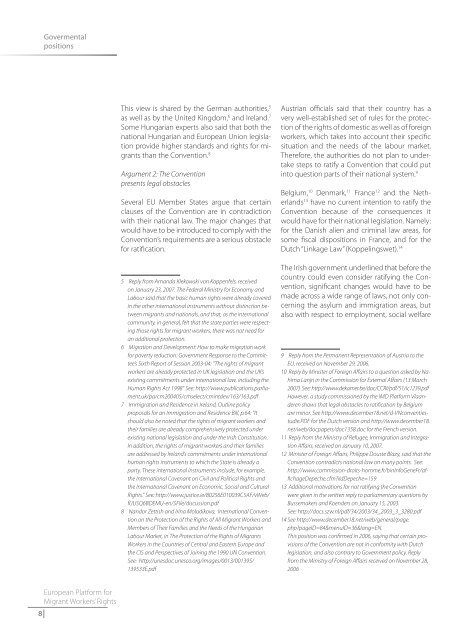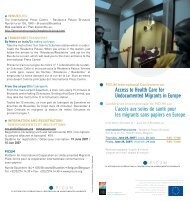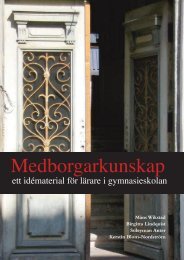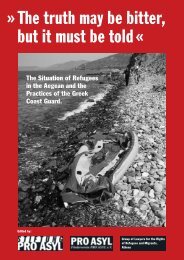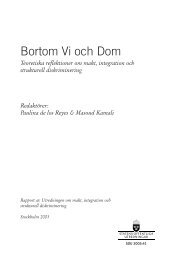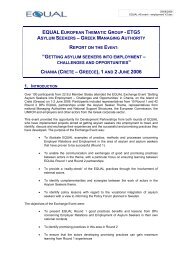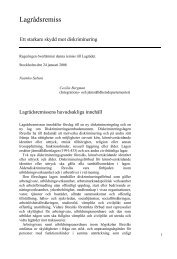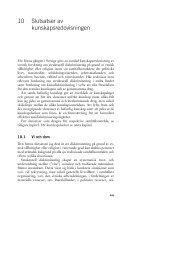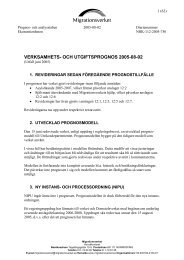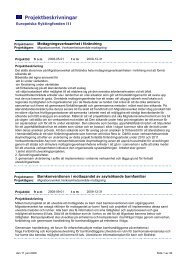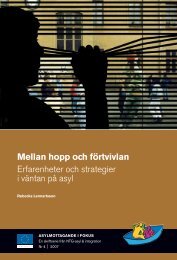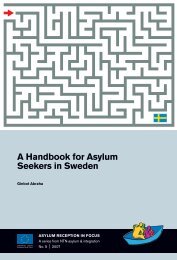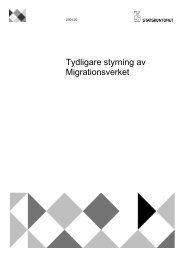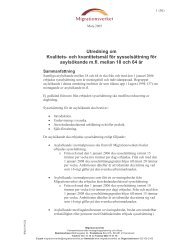The UN Migrant Workers Convention: Steps Towards Ratification
The UN Migrant Workers Convention: Steps Towards Ratification
The UN Migrant Workers Convention: Steps Towards Ratification
You also want an ePaper? Increase the reach of your titles
YUMPU automatically turns print PDFs into web optimized ePapers that Google loves.
Govermental<br />
positions<br />
This view is shared by the German authorities, <br />
as well as by the United Kingdom, and Ireland. <br />
Some Hungarian experts also said that both the<br />
national Hungarian and European Union legislation<br />
provide higher standards and rights for migrants<br />
than the <strong>Convention</strong>. <br />
Argument 2: <strong>The</strong> <strong>Convention</strong><br />
presents legal obstacles<br />
Several EU Member States argue that certain<br />
clauses of the <strong>Convention</strong> are in contradiction<br />
with their national law. <strong>The</strong> major changes that<br />
would have to be introduced to comply with the<br />
<strong>Convention</strong>’s requirements are a serious obstacle<br />
for ratification.<br />
<br />
<br />
<br />
<br />
Reply from Amanda Klekowski von Koppenfels, received<br />
on January 23, 2007. <strong>The</strong> Federal Ministry for Economy and<br />
Labour said that the basic human rights were already covered<br />
in the other international instruments without distinction between<br />
migrants and nationals, and that, as the international<br />
community, in general, felt that the state parties were respecting<br />
those rights for migrant workers, there was not need for<br />
an additional protection.<br />
Migration and Development: How to make migration work<br />
for poverty reduction: Government Response to the Committee’s<br />
Sixth Report of Session 2003-04: “<strong>The</strong> rights of migrant<br />
workers are already protected in UK legislation and the UK’s<br />
existing commitments under international law, including the<br />
Human Rights Act 1998” See: http://www.publications.parliament.uk/pa/cm200405/cmselect/cmintdev/163/163.pdf<br />
Immigration and Residence in Ireland, Outline policy<br />
proposals for an Immigration and Residence Bill, p.64: “It<br />
should also be noted that the rights of migrant workers and<br />
their families are already comprehensively protected under<br />
existing national legislation and under the Irish Constitution.<br />
In addition, the rights of migrant workers and their families<br />
are addressed by Ireland’s commitments under international<br />
human rights instruments to which the State is already a<br />
party. <strong>The</strong>se international instruments include, for example,<br />
the International Covenant on Civil and Political Rights and<br />
the International Covenant on Economic, Social and Cultural<br />
Rights.” See: http://www.justice.ie/80256E010039C5AF/vWeb/<br />
flJUSQ6BDEMU-en/$File/discussion.pdf<br />
Nandor Zettish and Irina Molodikova, International <strong>Convention</strong><br />
on the Protection of the Rights of All <strong>Migrant</strong> <strong>Workers</strong> and<br />
Members of <strong>The</strong>ir Families and the Needs of the Hungarian<br />
Labour Market, in <strong>The</strong> Protection of the Rights of <strong>Migrant</strong>s<br />
<strong>Workers</strong> in the Countries of Central and Eastern Europe and<br />
the CIS and Perspectives of Joining the 1990 <strong>UN</strong> <strong>Convention</strong>.<br />
See: http://unesdoc.unesco.org/images/0013/001395/<br />
139533E.pdf<br />
Austrian officials said that their country has a<br />
very well-established set of rules for the protection<br />
of the rights of domestic as well as of foreign<br />
workers, which takes into account their specific<br />
situation and the needs of the labour market.<br />
<strong>The</strong>refore, the authorities do not plan to undertake<br />
steps to ratify a <strong>Convention</strong> that could put<br />
into question parts of their national system. <br />
Belgium, 10 Denmark, 11 France 12 and the Netherlands<br />
13 have no current intention to ratify the<br />
<strong>Convention</strong> because of the consequences it<br />
would have for their national legislation. Namely:<br />
for the Danish alien and criminal law areas, for<br />
some fiscal dispositions in France, and for the<br />
Dutch “Linkage Law” (Koppelingswet). 14<br />
<strong>The</strong> Irish government underlined that before the<br />
country could even consider ratifying the <strong>Convention</strong>,<br />
significant changes would have to be<br />
made across a wide range of laws, not only concerning<br />
the asylum and immigration areas, but<br />
also with respect to employment, social welfare<br />
Reply from the Permanent Representation of Austria to the<br />
EU, received on November 29, 2006.<br />
10 Reply by Minister of Foreign Affairs to a question asked by Nahima<br />
Lanjri in the Commission for External Affairs (13 March<br />
2007). See: http://www.dekamer.be/doc/CCRI/pdf/51/ic1239.pdf<br />
However, a study commissioned by the IMD Platform Vlaanderen<br />
shows that legal obstacles to ratification by Belgium<br />
are minor. See http://www.december18.net/d-VNconventiestudie.PDF<br />
for the Dutch version and http://www.december18.<br />
net/web/docpapers/doc1358.doc for the French version.<br />
11 Reply from the Ministry of Refugee, Immigration and Integration<br />
Affairs, received on January 10, 2007.<br />
12 Minister of Foreign Affairs, Philippe Douste Blazy, said that the<br />
<strong>Convention</strong> contradicts national law on many points. See:<br />
http://www.commission-droits-homme.fr/binInfoGeneFr/affichageDepeche.cfm?iIdDepeche=159<br />
13 Additional motivations for not ratifying the <strong>Convention</strong><br />
were given in the written reply to parliamentary questions by<br />
Bussemakers and Koenders on January 15, 2003.<br />
See: http://docs.szw.nl/pdf/34/2003/34_2003_3_3280.pdf<br />
14 See http://www.december18.net/web/general/page.<br />
php?pageID=84&menuID=36&lang=EN.<br />
This position was confirmed in 2006, saying that certain provisions<br />
of the <strong>Convention</strong> are not in conformity with Dutch<br />
legislation, and also contrary to Government policy. Reply<br />
from the Ministry of Foreign Affairs received on November 28,<br />
2006<br />
<br />
European Platform for<br />
<strong>Migrant</strong> <strong>Workers</strong>’ Rights


